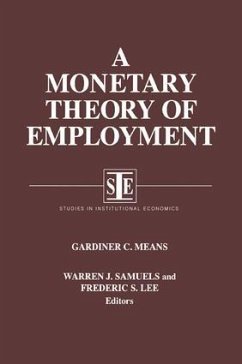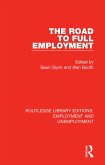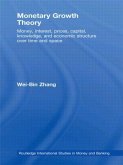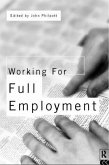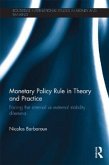- Broschiertes Buch
- Merkliste
- Auf die Merkliste
- Bewerten Bewerten
- Teilen
- Produkt teilen
- Produkterinnerung
- Produkterinnerung
Presents the author's alternative monetary theory and macroeconomics to both the quality theory and Keynes's work. This text reveals Means's view of the economic processes in the real world, and the state of monetary and macroeconomics theory in the mid-1940s.
Andere Kunden interessierten sich auch für
![A Second Edition of The General Theory A Second Edition of The General Theory]() Geoffrey Harcourt / Peter Riach (eds.)A Second Edition of The General Theory73,99 €
Geoffrey Harcourt / Peter Riach (eds.)A Second Edition of The General Theory73,99 €![The Road to Full Employment The Road to Full Employment]() The Road to Full Employment38,99 €
The Road to Full Employment38,99 €![International and Comparative Employment Relations International and Comparative Employment Relations]() International and Comparative Employment Relations62,99 €
International and Comparative Employment Relations62,99 €![Monetary Growth Theory Monetary Growth Theory]() Wei-Bin ZhangMonetary Growth Theory72,99 €
Wei-Bin ZhangMonetary Growth Theory72,99 €![Working for Full Employment Working for Full Employment]() John Philpott (ed.)Working for Full Employment43,99 €
John Philpott (ed.)Working for Full Employment43,99 €![Employment Regulation in the Workplace Employment Regulation in the Workplace]() Robert K RobinsonEmployment Regulation in the Workplace81,99 €
Robert K RobinsonEmployment Regulation in the Workplace81,99 €![Monetary Policy Rule in Theory and Practice Monetary Policy Rule in Theory and Practice]() Nicolas BarbarouxMonetary Policy Rule in Theory and Practice84,99 €
Nicolas BarbarouxMonetary Policy Rule in Theory and Practice84,99 €-
-
-
Presents the author's alternative monetary theory and macroeconomics to both the quality theory and Keynes's work. This text reveals Means's view of the economic processes in the real world, and the state of monetary and macroeconomics theory in the mid-1940s.
Hinweis: Dieser Artikel kann nur an eine deutsche Lieferadresse ausgeliefert werden.
Hinweis: Dieser Artikel kann nur an eine deutsche Lieferadresse ausgeliefert werden.
Produktdetails
- Produktdetails
- Verlag: Routledge
- Seitenzahl: 296
- Erscheinungstermin: 31. März 1995
- Englisch
- Abmessung: 229mm x 152mm x 16mm
- Gewicht: 432g
- ISBN-13: 9781563244780
- ISBN-10: 1563244780
- Artikelnr.: 21848473
- Herstellerkennzeichnung
- Libri GmbH
- Europaallee 1
- 36244 Bad Hersfeld
- gpsr@libri.de
- Verlag: Routledge
- Seitenzahl: 296
- Erscheinungstermin: 31. März 1995
- Englisch
- Abmessung: 229mm x 152mm x 16mm
- Gewicht: 432g
- ISBN-13: 9781563244780
- ISBN-10: 1563244780
- Artikelnr.: 21848473
- Herstellerkennzeichnung
- Libri GmbH
- Europaallee 1
- 36244 Bad Hersfeld
- gpsr@libri.de
Gardiner C. Means (1896-1988) was the co-author, with Adolf A. Berle, Jr., of The Modern Corporation and Private Property (1932) and, with James C. Bonbright, of The Holding Company: Its Public Significance and Its Regulation (1932). Although an academic outsider, he worked for a number of federal government agencies, most notably the U.S. Department of Agriculture and the National Resources Committee; and for the Committee for Economic Development and the Fund for the Republic. He wrote or edited numerous other volumes. He emphasized administered pricing by corporations and the resultant tendency to inflation as both an accurate description of reality and a basis for policy. Warren J. Samuels is Professor of Economics at Michigan State University, East Lansing, Michigan. He specializes in the history of eco nomic thought, the economic role of government, and methodology. He is author of The Classical Theory o f Economic Policy and Pareto on Policy, a co-author of Gardiner C. Means: Institutionalist and Post Keynesian, co-editor of The Elgar Companion to Institutional and Evolutionary Economics and Research in the History of Economic Thought and Methodology, and the author of numerous articles and book reviews. He has been president of the History of Economics Society and the Association for Social Economics. Frederic S. Lee is a Reader in Economics at DeMontfort University, Leicester, England. His areas of interest include Post Keynesian price theory, history of economics, and the Industrial Workers of the World. He is a co-editor of The Heterodox Economics of Gardiner C. Means and has written articles on Means that have appeared in the Review of Social Economy, the Journal of Economic Issues, and the Journal of Policy History. His other published articles have appeared in the Journal of Post Keynesian Economics, the Review of Political Economy, and the History of Political Economy.
Introduction: Means and the Making of an Anti-Keynesian Monetary Theory of
Employment 1. Introduction Part I. Theories of Employment 2. The
Saving-Investment Theory of Employment 3. A Challenge to the
Saving-Investment Theory 4. The Classical Theory of Employment 5. The
Marxian Theory of Employment Part II. An Insensitive-Price Theory of
Economic Adjustment 6. Insensitive Prices and Wage Rates 7. Aggregate
Demand and Insensitive Prices Part III. A Monetary Theory of Aggregate
Demand 8. The Demand for Money 9. Assets and Economic Management 10. The
Determinants of Aggregate Demand Part IV. A Monetary Theory of Employment
11. A Monetary Theory of Employment 12. The Necessity of Testing the
Monetary Theory 1Part V. Problems of Corrective Action 13. The Problem of
Maintaining Full Employment 14. The Problem of Achieving Full Employment
115. The Problem of Inflation 16. Dynamic Problems17. Certain International
Implications of the Monetary Theory 18. Toward a Positive Program
Employment 1. Introduction Part I. Theories of Employment 2. The
Saving-Investment Theory of Employment 3. A Challenge to the
Saving-Investment Theory 4. The Classical Theory of Employment 5. The
Marxian Theory of Employment Part II. An Insensitive-Price Theory of
Economic Adjustment 6. Insensitive Prices and Wage Rates 7. Aggregate
Demand and Insensitive Prices Part III. A Monetary Theory of Aggregate
Demand 8. The Demand for Money 9. Assets and Economic Management 10. The
Determinants of Aggregate Demand Part IV. A Monetary Theory of Employment
11. A Monetary Theory of Employment 12. The Necessity of Testing the
Monetary Theory 1Part V. Problems of Corrective Action 13. The Problem of
Maintaining Full Employment 14. The Problem of Achieving Full Employment
115. The Problem of Inflation 16. Dynamic Problems17. Certain International
Implications of the Monetary Theory 18. Toward a Positive Program
Introduction: Means and the Making of an Anti-Keynesian Monetary Theory of
Employment 1. Introduction Part I. Theories of Employment 2. The
Saving-Investment Theory of Employment 3. A Challenge to the
Saving-Investment Theory 4. The Classical Theory of Employment 5. The
Marxian Theory of Employment Part II. An Insensitive-Price Theory of
Economic Adjustment 6. Insensitive Prices and Wage Rates 7. Aggregate
Demand and Insensitive Prices Part III. A Monetary Theory of Aggregate
Demand 8. The Demand for Money 9. Assets and Economic Management 10. The
Determinants of Aggregate Demand Part IV. A Monetary Theory of Employment
11. A Monetary Theory of Employment 12. The Necessity of Testing the
Monetary Theory 1Part V. Problems of Corrective Action 13. The Problem of
Maintaining Full Employment 14. The Problem of Achieving Full Employment
115. The Problem of Inflation 16. Dynamic Problems17. Certain International
Implications of the Monetary Theory 18. Toward a Positive Program
Employment 1. Introduction Part I. Theories of Employment 2. The
Saving-Investment Theory of Employment 3. A Challenge to the
Saving-Investment Theory 4. The Classical Theory of Employment 5. The
Marxian Theory of Employment Part II. An Insensitive-Price Theory of
Economic Adjustment 6. Insensitive Prices and Wage Rates 7. Aggregate
Demand and Insensitive Prices Part III. A Monetary Theory of Aggregate
Demand 8. The Demand for Money 9. Assets and Economic Management 10. The
Determinants of Aggregate Demand Part IV. A Monetary Theory of Employment
11. A Monetary Theory of Employment 12. The Necessity of Testing the
Monetary Theory 1Part V. Problems of Corrective Action 13. The Problem of
Maintaining Full Employment 14. The Problem of Achieving Full Employment
115. The Problem of Inflation 16. Dynamic Problems17. Certain International
Implications of the Monetary Theory 18. Toward a Positive Program

